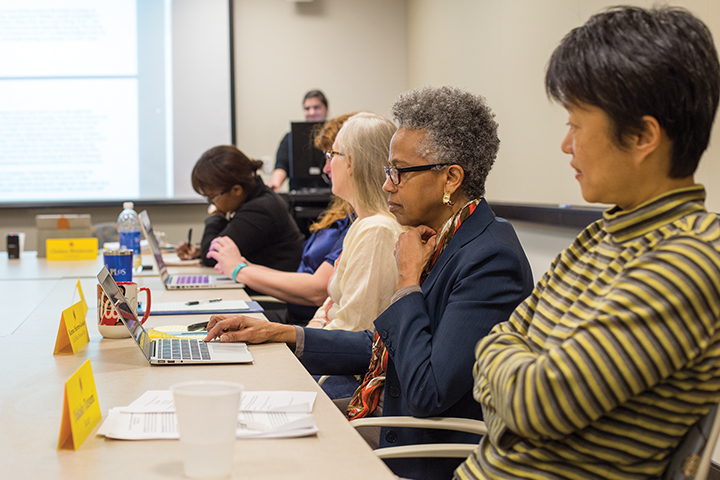The University Senate can create academic programs and courses, draft policies and alter procedures — and is one of just four Big Ten schools to employ a shared governance system that includes students, faculty and staff in one combined decision-making body.
But, according to last year’s data, only about 5 percent of undergraduate students and 5 percent of graduate students participated in the 2015 election.
Most other Big Ten senates — aside from Rutgers University, the University of Minnesota and the University of Illinois, which also have a similar shared governance systems, according to their websites — have separate bodies for faculty and students, which sometimes include staff. Often, universities have only faculty senates.
University of Maryland President Wallace Loh called this university’s shared governance structure “distinctive,” as it combines all three constituencies into one body.
“The beauty of a combined [senate] is that we are one university,” he said. “The faculty cannot do their work without the support of staff and educating students would not happen without faculty and staff working to support the educational mission of the school — so it makes sense that all three would be together.”
The university has a total of 222 senators, made up of 27 undergraduate students, 10 graduate students, 139 faculty members and 24 staff members. The senate underwent a restructuring process in 2015, apportioning representation and increasing the total number of senators from 182 to 222.
As a governing body, the senate is responsible for advising the university president on policies and concerns dealing with education, budget, personnel, campus community, long-range plans, facilities and faculty, staff and student affairs, according to its website.
The senate is working to polish the sexual misconduct policy, modify policies on gender markers and discrimination and approve new university programs, such as a master’s degree in business analytics.
Despite these initiatives and efforts, though, many students are unfamiliar with the governing body and its role in the university community, said Reka Montfort, senate director.
“Students especially don’t understand what it means to vote for [someone who is] their voice to the administration, voting on policy that could affect them in the future,” Montfort said.
Even Oluwaseyi Ogundana, a junior running to be an undergraduate representative for the computer, mathematical and natural sciences college for next year, said in the past she hadn’t really heard of the senate.
Now, she’s pushing for students to vote and understand the role it plays at the university.
“I’ve been trying to get people in my college to vote,” the physiology and neurobiology major said. “You’re getting represented, right? You would think people care. … I want them to know they do have a voice in your environment.”
Voting opened online on Feb. 22 to elect next year’s senate representatives and will remain open until midnight on Friday.
Undergraduate students can vote for a senator to represent their college, graduate students vote for a representative at-large and staff vote for someone within their distinction and their department. Faculty are chosen through a separate process.
Despite struggles in awareness and voting rates, though, the senate’s structure allows for everyone’s voice to be heard in the decision-making process, said Stacey Locke, the senior director of development and corporate relations for the computer, mathematical and natural sciences college, who represents exempt staff on the senate.
Locke, who serves as the senate’s Equity, Diversity and Inclusion committee chairwoman, said that despite working in higher education for many years, she‘d never sat in a meeting where her opinion was valued enough to allow her the opportunity to vote a new major into policy — until her role at this university.
“The organizational model does create an equity, in many institutions staff are like second-class citizens,” she said. “In other places where I’ve been, there hasn’t actually been a constituency group that I felt represented me.”
Graduate student Kevin Fitzgerald, who sits on the Senate Executive Committee, said he has been impressed by how much his role is valued.
His committee is responsible for recommending legislation and policies to committees onto the senate floor or to Loh.
“It’s unique that we’re a part of the process. There are things that directly affect students and, as a student, there’s an opportunity to bring forth things that matter to us,” said Fitzgerald, who is studying real estate development. “My vote counts as much as [a faculty member’s] does.”
And, though Locke said there may be some stakeholders left out of the process — such as alumni or parents — she believes the system still positively benefits the policies that move forward from the senate.
“I think [the policies] are much more reflective of the community’s will and the policy itself has a lot more vetting before it actually goes into effect,” Locke said. “You have people sitting around the room from every constituency group.”
As much as senators do to try to represent their constituents, Fitzgerald said it’s important to bring up important issues your representative. That, and vote.
“I absolutely think people should vote, reach out to their current senators,” he said. “It’s been eye opening, in a good way, knowing there is an appropriate place to talk about pretty much every policy at the university. … It’s a powerful place to be.”



